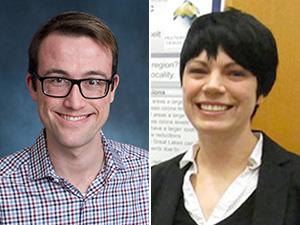Kevin Barry and Jennie Bukowski receive department honors for student research
Kevin Barry and Jennie Bukowski were honored for outstanding student research in a virtual ceremony May 14. Barry received the Herbert Riehl Memorial Award for his paper, “Observations of Ice Nucleating Particles in the Free Troposphere From Western US Wildfires,” based on his research from the WE-CAN wildfire smoke campaign. Bukowski received the Alumni Award for “Dust Radiative Effects in Haboobs,” based on her Ph.D. research on the lofting and transport of mineral dust, dust radiation interactions, and the representation of these processes in numerical models.
Barry was nominated by his advisers, University Distinguished Professor Sonia Kreidenweis and Senior Research Scientist Paul DeMott, and also by Research Scientist Tom Hill. DeMott presented Barry with his award.
“Some things that characterize Kevin since he has joined our department are his willingness and fearlessness in diving into any task, his desire to learn, and his always seeking to be helpful,” DeMott said.
DeMott noted that the groundbreaking nature of Barry’s work was recognized in a research spotlight by AGU’s Eos. Barry also presented his work in the CSU Graduate Showcase, which led to his invitation to the university-wide three-minute thesis challenge. Based on his presentation, “Can wildfires influence ice in clouds?,” Barry was awarded a Vice President for Research Graduate Fellowship.
“The novelty of Kevin’s work is that no one had previously performed systematic and comprehensive measurements of the role of wildfires in generating and lofting these cloud-active aerosols at plume-injection heights where they actually enter clouds,” DeMott said.
Herbert Riehl, Jr. attended the award ceremony remotely. The Herbert Riehl Memorial Award honors his father, who founded the department.
The Alumni Award recognizes outstanding Ph.D. research by a senior student. In Professor Sue van den Heever’s introduction of this year’s recipient, she kept Bukowski’s identity secret for as long as possible, a department tradition.
“This student’s scientific mantra really is twofold: to ensure that you conduct the best science possible and then to apply that science to enhance societal benefits,” van den Heever said. “While most of us believe that this twofold approach is important, many of us end up focusing on either the first or the second of these goals. This student really actively strives to achieve both of those goals.”
van den Heever recognized Bukowski’s work as highly interdisciplinary, given the importance of dust to human health, radiation, ocean fertilization and ice nucleation.
“Jennie has made some really novel and original contributions to the field by examining the interaction of radiation with the large amounts of dust transported within haboobs, as well as the role played by land surface processes in determining haboob intensity,” van den Heever said. “This research has not only enhanced our theoretical understanding of haboob processes, but has also contributed to the way in which we represent haboobs in models.”
Barry and Bukowski each gave a brief technical presentation on their research following announcement of their awards.



